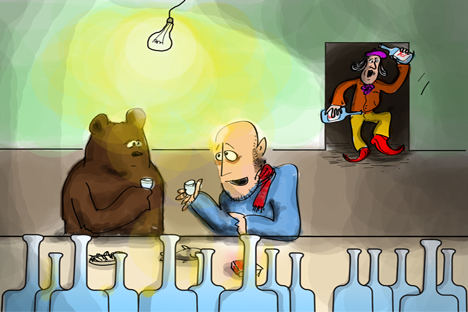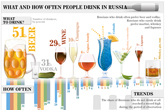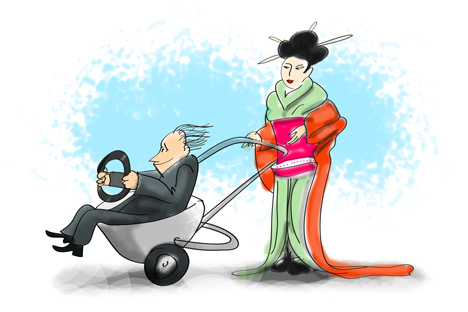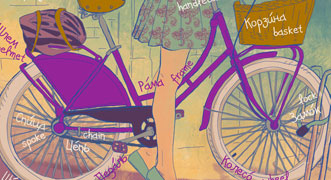Booze, alkie, half-liter: A Russian dictionary of alcohol

Click to enlarge the cartoon. Drawing by Niyaz Karim
“Happiness in Rus means drinking; we can’t live without it” (Руси есть веселье пити, не можем без того быти"). According to legend, these words were spoken by Vladimir, the prince of Kievan Rus, in 988 when he chose for his people the religion of Orthodox Christianity (which permitted alcohol) over Islam (which propagated sobriety).
In the 15th century, the Slavs learned to concoct “bread wine” (хлебное вино), which was the name for vodka at the time. The drink has now been considered the Russian national beverage for more than 500 years.
Holidays or visits by guests are not the only traditional reasons to drink. For example, a new purchase may inspire a celebratory drink. The word that describes this action in this context is obmyt’(обмыть) —literally, “to wash off” the item so it will last longer. But really, if there is a desire to drink, no special reason is required. If someone says, “It’s started to get cold” (Что-то стало холодать…) practically every Russian can complete the rhyme, saying: “Isn’t it time we knocked one back?” (не пора ли нам поддать?).
A standard bottle of vodka holds half a liter and is thus called a “half liter” (поллитра). This word refers specifically to a bottle of vodka and not to any other beverage. Spirits are generally referred to as “alcohol” (выпивка) and informally as “booze” (бухло or кир), from the popular slang verbs meaning “to booze it up” (бухать or кирять). In general, Russian dictionaries contain several dozen verbs that describe the process of drinking, and masters of ceremonies at Russian weddings entertain guests by staging contests to see who can list the greatest number of these verbs.
During the Soviet era, in addition to vodka, port (портвейн) was popular, especially among students - cheap fortified wine was sold under this name. Due to its potency and ability to weaken people’s speech, it was called “mumbler” (бормотухой, from the verb бормотать). Port is still cheap and popular today.
When the liquor runs out during a party, it is usually necessary to go buy more. Therefore, when planning how much to buy, people usually say: “No matter how much you buy, you’ll still need to run out for more” (Сколько ни бери, все равно бежать). This situation is described by the phrase “to send a runner” (послать гонца), which is a short form of the rhyming expression “Should we send a runner out for a little bottle of wine?” (Не послать ли нам гонца за бутылочкой винца?).
In the Soviet Union, stores closed early, but it was easy to buy vodka from taxi drivers — for a higher price, naturally. In contemporary Russia, this problem did not exist until recently: Alcohol used to be sold in 24-hour stores, but, a few years ago, restrictions were put in place. Today, no alcohol is sold after 11 p.m. in the city of Moscow or after 9 p.m. in the Moscow Region.
A particular type of parody of the traditional ritual of the Russian feast can be seen in Georgy Daneliya’s comedy “Autumn Marathon.” (Осенний марафон). In the film, a St. Petersburg professor of language and literature and his guest, a Danish scholar, are working on a translation of Dostoevsky. However, the professor’s neighbor, a locksmith, keeps disrupting their work. Because it’s the locksmith’s day off, he considers it completely normal to invite the two men over for a bottle of vodka in the morning.
After some drinking, an uncomfortable silence falls over the kitchen table. The locksmith breaks it with a line that became part of the popular lexicon in Russia: “We’re sitting pretty” (Хорошо сидим). Returning to work on the translation is out of the question, and the locksmith and professor continue to get drunk together. After a routine trip to the store, the professor ends up in the drunk tank.
“I’ve learned some new words,” the professor tells his colleague in the morning. “I’m an alkach, (алкач) right?” He is right, but not completely. The correct form of this word is alkash (алкаш), “alkie,” and it is a widely used short from of the word alkogolik (алкоголик) “alcoholic.” There is generally an accepted distinction between “alcoholic” (алкоголиков) and “drunk” (пьяниц): Alcoholics suffer from in insurmountable physiological craving for alcohol, while a drunk can drink (and usually quite a lot), but he can also not drink.
The topic of alcohol makes frequent appearances in other Soviet films. In “The Fate of a Man,” (Судьба человека), which was shot in the late 1950s, a Soviet prisoner of war amazes German officers with his ability to down three large glasses of vodka consecutively; furthermore, he drinks the first two without chasers. “A Russian soldier doesn’t chase the first one—or the second one, for that matter” (русский солдат после первой не закусывает; ну, и после второй тоже), he says.
However, the major film on this subject is without a doubt the 1970s cult hit “The Irony of Fate,” (Ирония судьбы), which for several decades has been broadcast on television every Dec. 31. The hero, who lives in a standard building in Moscow, goes with three friends to a banya on Dec. 31; after a few bottles of vodka, he flies instead of one of his friends to Leningrad. There, on New Year’s Eve and in drunken oblivion, he ends up in a standard apartment with an address identical to his Moscow apartment, but in a different city. The comedic developments of his relationship with the woman who lives in the Leningrad apartment unexpectedly evolve into romantic feelings, and everything leads to a radical change in the characters’ personal lives.
Still, even with all the romanticizing, drunkenness in the Soviet era was a serious social problem. Mikhail Gorbachev, who became the leader of the Soviet Union in 1985, immediately took steps to restrict it. These measures were even called “dry laws” (сухим законом), even though there was no outright ban on alcohol. The movies became a victim of this campaign: When old films were adapted for television, scenes of drinking sprees were cut out.
After 1991, a new wave of alcoholism struck Russia: kiosks filled up with imported Crown Royal; television, even in prime time, broadcast advertisements for Smirnoff, Rasputin and even (yes, paradoxically) Gorbachev vodka. Today, Russian supermarkets sell dozens of brands of high-quality alcohol and even if it’s no longer possible to buy alcohol 24 hours a day, Russian consumers are indeed “sitting pretty.”
All rights reserved by Rossiyskaya Gazeta.
Subscribe
to our newsletter!
Get the week's best stories straight to your inbox




